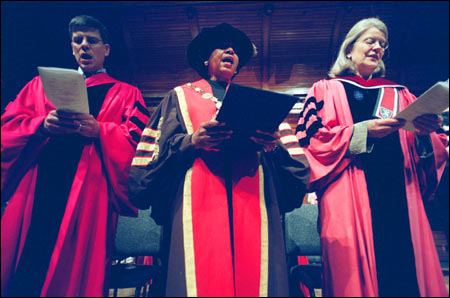Prose and poetry inspire at PBK:
Simmons moves audience with her life story, Oliver with her poetry

Two extraordinary women contributed their inspiring presence to this year’s Phi Beta Kappa (PBK) Literary Exercises. Ruth Simmons, president of Brown University, presented the oration, and Mary Oliver, winner of the Pulitzer Prize and the National Book Award, read the Phi Beta Kappa poem.
Simmons, the first African-American woman to serve as president of an Ivy League University, began by speaking about her own feelings and expectations upon coming to Harvard as a graduate student in French more than 30 years ago.
She had already come a great distance from her origins as one of 12 children of poor sharecroppers in the segregated community of Grapeland, Texas, a place where it could be dangerous for blacks simply to exhibit intelligence and aspiration.
Simmons said she learned to survive by distinguishing between who she was and how she was perceived. She also survived by taking refuge in the world of literature.
“Literature was a lifeline. I could move between works of literature without a passbook or a sideways glance. It was a world where value and meaning were not dictated by race.”
Simmons’ love of learning and her quest for meaning led her to apply for college, something no one in her family, or even her community, had done before. She earned a B.A. from Dillard University in New Orleans in 1967.
Arriving at Harvard to study French literature, Simmons said she felt “the sting of inadequacy.” An experience during her first week of classes bolstered her confidence but also showed her she would be facing special obstacles.
A professor in one of her literature courses assigned an explication du texte. Simmons said she was “stunned” when he singled out her paper as the only one he considered excellent.
“But the surprise in his eyes when he handed the paper back to me revealed that I would have to prove over and over again that I deserved my place at Harvard.”
Harvard, she said, became a “proving ground” for her courage and intelligence. “I came to understand that I not only deserved to be here – I needed to be here.” But she also realized that she would have to give up the strategy she had used to survive in the segregated South and reveal to her colleagues who she truly was. She thanked Harvard for teaching her that lesson.
“Harvard put in my path a diversity of people and perspectives that allowed me to understand who I am.”
Simmons said that even professors who recognized her ability were less than sanguine about her chances for success in academia. Today, from the perspective of having served as a professor and administrator at some of the most prestigious institutions of higher learning, Simmons has forged a philosophy from that experience that has served her both as a person and as an educational leader.
“I put my faith in preparing myself for what the future might bring,” she said. “And I believe that universities function best when they are preparing the way for important, positive change.”
Oliver read a long, seven-part poem, called simply “To the Members of Phi Beta Kappa of the Harvard Class of 2003,” which sounded at times almost like a commencement speech in free verse. The Sanders Theatre audience, grateful, it seemed, for being addressed in a way they could both profit from and understand, greeted her words with rapt attention and, afterward, with thunderous applause.
One of America’s best-loved poets, Oliver is the author of 12 volumes of poetry, which, in the words of PBK President Diana Eck, professor of comparative religion and Indian studies, “have become the prayer books of an increasingly secular and yet deeply spiritual world.” In her poem, Oliver interspersed sharply observed evocations of oak trees, loons, and singing thrushes with direct words of advice:
“There are many paths to power. Meanness is one of them. Kindness may take longer, but is more long-lasting.”
The last line seemed to merge the two elements, combining exhortation with a suggestion of the natural world:
“Stay young forever in the wide fields of your mind.”
The ceremony also featured the presentation of the Phi Beta Kappa Teaching Awards, which were instituted in 1981. The winners were Eric N. Jacobsen, the Sheldon Emery Professor of Chemistry; Stephen P. Rosen, the Beton Michael Kaneb Professor of National Security and Military Affairs and director of the Olin Institute; and James Wilkinson, lecturer on history and literature and director of the Derek Bok Center for Teaching and Learning.
Dorothy Austin, University chaplain and co-master of Lowell House, read the invocation and benediction. The Harvard-Radcliffe Collegium Musicum, conducted by Jameson Marvin, director of choral activities, provided two musical interludes: a short poem by Phyllis Wheatley set to music by Marvin, and “Bogoroditse Devo” by Sergei Rachmaninoff.
Harvard’s chapter of Phi Beta Kappa, founded in 1781, is the oldest uninterrupted chapter of the organization in the nation. The Radcliffe chapter was founded in 1914, and the two were merged in 1995. Originally held in Holden Chapel, the Phi Beta Kappa Exercises have taken place in Sanders Theatre since 1876.




